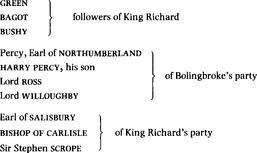Our early impressions of Richard are unsympathetic. Having banished Mowbray and Bolingbroke, he behaves callously to Bolingbroke’s father, John of Gaunt, a stern upholder of the old order to whose warning against his irresponsible behaviour he pays no attention, and upon Gaunt’s death confiscates his property with no regard for Bolingbroke’s rights. During Richard’s absence on an Irish campaign, Bolingbroke returns to England and gains support in his efforts to claim his inheritance. Gradually, as the balance of power shifts, Richard makes deeper claims on the audience’s sympathy. When he confronts Bolingbroke at Flint Castle (3.1) he eloquently laments his imminent deposition even though Bolingbroke insists that he comes only to claim what is his; soon afterwards (4.1.98-103) the Duke of York announces Richard’s abdication. The transference of power is effected in a scene of lyrical expansiveness, and Richard becomes a pitiable figure as he is led to imprisonment in Pomfret (Pontefract) Castle while his former queen is banished to France. Richard’s self-exploration reaches its climax in his soliloquy spoken shortly before his murder at the hands of Piers Exton; at the end of the play, Henry, anxious and guilt-laden, denies responsibility for the murder and plans an expiatory pilgrimage to the Holy Land.
THE PERSONS OF THE PLAY
KING RICHARD II
The QUEEN, his wife
JOHN OF GAUNT, Duke of Lancaster, Richard’s uncle
Harry BOLINGBROKE, Duke of Hereford, John of Gaunt’s son, later
KING HENRY IV
DUCHESS OF GLOUCESTER, widow of Gaunt’s and York’s brother
Duke of YORK, King Richard’s uncle
DUCHESS OF YORK
Duke of AUMERLE, their son
Thomas MOWBRAY, Duke of Norfolk

Lord BERKELEY
Lord FITZWALTER
Duke of SURREY
ABBOT OF WESTMINSTER
Sir Piers EXTON
LORD MARSHAL
HERALDS
CAPTAIN of the Welsh army
LADIES attending the Queen
GARDENER
Gardener’s MEN
Exton’s MEN
KEEPER of the prison at Pomfret
GROOM of King Richard’s stable,
Lords, soldiers, attendants
The Tragedy of King Richard the Second
1.1 Enter King Richard and John of Gaunt, with the Lord Marshal, other nobles, and attendants
KING RICHARD
Old John of Gaunt, time-honoured Lancaster,
Hast thou according to thy oath and bond
Brought hither Henry Hereford, thy bold son,
Here to make good the boist’rous late appeal,
Which then our leisure would not let us hear,
Against the Duke of Norfolk, Thomas Mowbray?
JOHN OF GAUNT I have, my liege.
KING RICHARD
Tell me moreover, hast thou sounded him
If he appeal the Duke on ancient malice
Or worthily, as a good subject should,
On some known ground of treachery in him?
JOHN OF GAUNT
As near as I could sift him on that argument,
On some apparent danger seen in him
Aimed at your highness, no inveterate malice.
KING RICHARD
Then call them to our presence.
[Exit one or more]
Face to face
And frowning brow to brow, ourselves will hear
The accuser and the accused freely speak.
High-stomached are they both and full of ire;
In rage, deaf as the sea, hasty as fire.
Enter Bolingbroke Duke of Hereford, and Mowbray Duke of Norfolk
BOLINGBROKE
Many years of happy days befall
My gracious sovereign, my most loving liege!
MOWBRAY
Each day still better others’ happiness,
Until the heavens, envying earth’s good hap,
Add an immortal title to your crown!
KING RICHARD
We thank you both. Yet one but flatters us,
As well appeareth by the cause you come,
Namely, to appeal each other of high treason.
Cousin of Hereford, what dost thou object
Against the Duke of Norfolk, Thomas Mowbray?
BOLINGBROKE
First—heaven be the record to my speech—
In the devotion of a subject’s love,
Tend’ring the precious safety of my Prince,
And free from other misbegotten hate,
Come I appellant to this princely presence.
Now, Thomas Mowbray, do I turn to thee;
And mark my greeting well, for what I speak
My body shall make good upon this earth,
Or my divine soul answer it in heaven.
Thou art a traitor and a miscreant,
Too good to be so, and too bad to live,
Since the more fair and crystal is the sky,
The uglier seem the clouds that in it fly.
Once more, the more to aggravate the note,
With a foul traitor’s name stuff I thy throat,
And wish, so please my sovereign, ere I move
What my tongue speaks my right-drawn sword may
prove.
MOWBRAY
Let not my cold words here accuse my zeal.
’Tis not the trial of a woman’s war,
The bitter clamour of two eager tongues,
Can arbitrate this cause betwixt us twain.
The blood is hot that must be cooled for this.
Yet can I not of such tame patience boast
As to be hushed and naught at all to say.
First, the fair reverence of your highness curbs me
From giving reins and spurs to my free speech,
Which else would post until it had returned